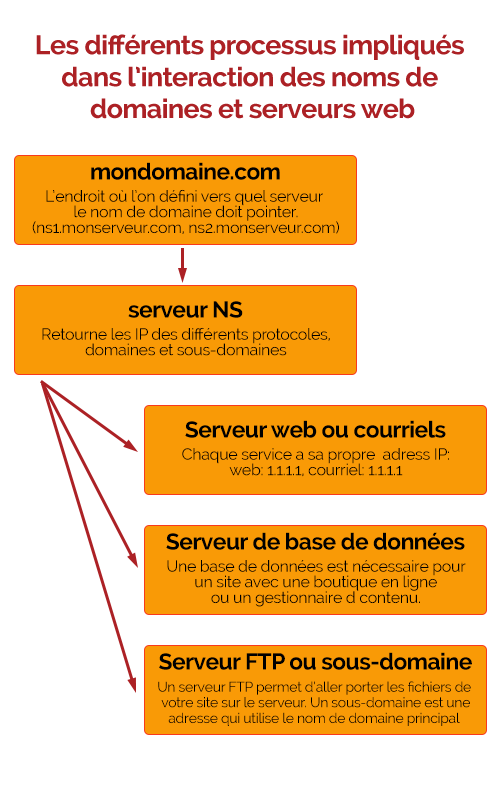When someone talks to you about reserving a domain name or hosting a website on a server, do you have the impression that someone is speaking to you in a foreign language? What is the difference, how do they interact, and why does the reservation of domain names not include the hosting of my site and vice versa?
In this article, we will demystify the difference between the two, how they are related, and why the two are independent.
Domain names
A domain name is a bit like your postal address, it’s what we give as information to people who want to visit us.
Your domain name, however, must have the correct information to redirect visitors to the server where your domain’s files are located.
I want a domain name, what do I do?
To obtain a new domain name, all you have to do is find a registrar, check if the desired domain name is available and proceed with the reservation.
Following the reservation, you must go to the management of the domain name and specify the DNS addresses of your web/email server there. This is called changing the DNS. According to different Internet providers, the change can take up to 72 hours before being propagated all over the world. We have no control over DNS propagation. We will come back to DNS and servers a little later in this article.
The reservation of domain names must be paid regularly, different periods are available, in terms of a year or more. For a new main domain name, it is recommended to reserve it for at least 3 years, ideally 5 years.
It is also recommended to reserve secondary domain names to protect your brand, they can be reserved for a single year without any problem. For example:
- mydomain.com: 5 years
- mydomain.ca: 1 years
- mydomain.info: 1 year
- mydomain.net: 1 year
and so on.
You must also add the DNS of your server in the management of these secondary domains.
I already have a domain name, what do I do?
If you’re happy with your registrar, just go there and specify the correct DNS addresses for the web/email server if you haven’t already done so.
If you wish to change registrar, there is a procedure to protect the owner of a domain name from an unapproved transfer. Transferring a domain name adds an additional year to the remaining term of the domain name and can take up to 7 days to complete, so don’t wait until the day before renewal!
Here is the process of transferring a domain name:
- The owner must have access to their current registrar.
- He must request a transfer key from his current registrar
- He must then request the transfer from the new registrar (who will ask him for his transfer key)
The rest of the procedure depends on the registrars, some require confirmation by email, others do not. You just have to wait and take action according to the emails received.
Overview of a web server
A web server is basically a computer, with a Windows or Linux operating system, depending on the provider. It is configured with special applications that allow visitors to view your site and you to change content on your site and send and receive emails.
Each web server has a dynamic name server (DNS) address, which is used to link the domain name to your content. This is why you must add the DNS address of your server in your domain name.
Why are some servers more expensive and some cost next to nothing?
Every server configuration is different. The majority of servers that seem very economical are “shared” type servers, that is, you share it with many other users. This type of server is usually slower and more likely to be “hacked”, simply due to the number of sites that are installed there and which are not updated. In addition, the loading speed of your website is an important factor for SEO, so it’s a good thing to think about.

Servers that are a little more expensive usually offer advantages:
- A custom setup
- The sites hosted there are filtered and chosen
- The physical location of the server will be used for referencing
- Content managers updates are included and performed regularly
Conclusion
If you plan to have a website eventually, it is important to reserve your domain name as soon as possible, in order to protect your identity on the web. A web server can wait until your website is ready to go live. But both are essential for publishing a website.

